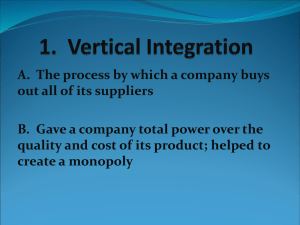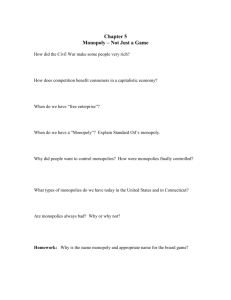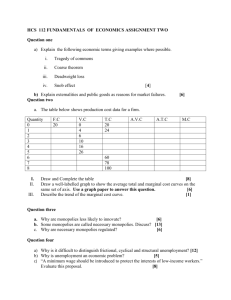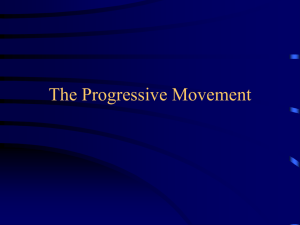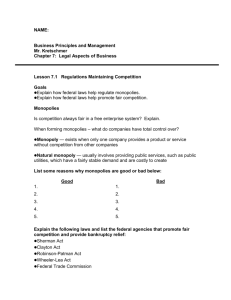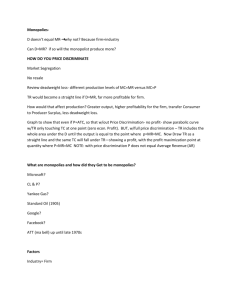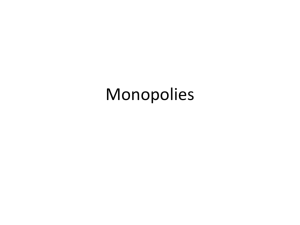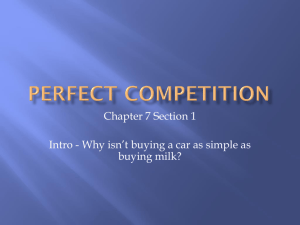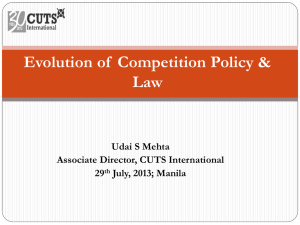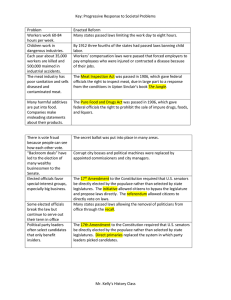How To Create A Monopoly Power Point
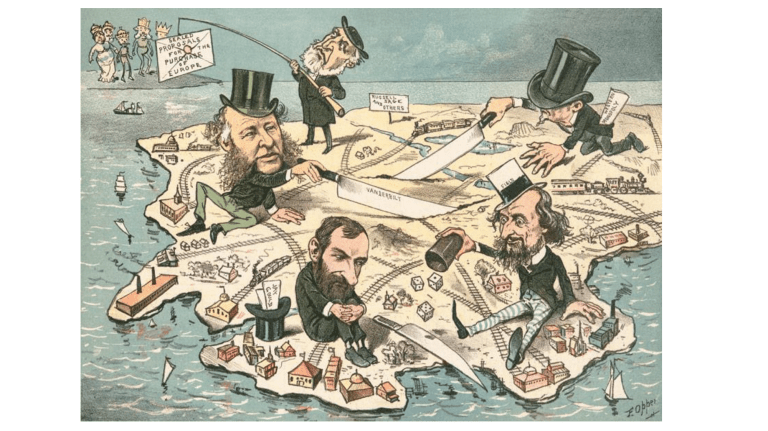
How to build a monopoly
Vertical Integration: a process in which a business buys out its suppliers of raw materials, transportation of products, and distributors of retail goods.
Horizontal Integration: the process of a business buying competitors out or forcing them out of business by engaging in other methods to eliminate competition in the market place.
Corporations
• A type of business organization in which investors purchase shares of ownership in a business called stock. As the business profits the stockholders share in the wealth through the payment of dividends and an increase in the value of the traded stock.
• Businesses enjoy limited liability when organized as corporations. The individual owners of the business cannot be held legally liable in any suits filed against the business.
• Corporations are also granted the same constitutional rights and privileges as individuals such as freedom of speech.
Trust’s and Pool’s
• A trust is an unincorporated business organization created by a legal document, a declaration of trust, and used in place of a corporation or partnership for the transaction of various kinds of business with limited liability.
• The use of a business trust originated years ago to circumvent restrictions imposed upon corporate acquisition and development of real estate while achieving the limited liability aspect of a corporation.
• A pool can be defined as a union of different companies in the same or similar arena of business. The main aim behind such coming together is to limit competition among themselves in such a way that each company gets the maximum profits.
Why are monopolies bad?
• By eliminating competition the market forces of supply and demand are altered.
Prices for goods and services offered by the monopoly are higher and the quality of those goods and services are often poor.
• Innovation is restricted. If there is no competition there is no motivation to develop new and better goods and services.
• Consumer spending is concentrated in one place and the overall economy will not show growth as a result (unequal distribution of wealth).
• Growing economic power can lead to corporations using their wealth to influence and control government policies for their own benefit.
Justification for the creation of monopolies
• The American Dream – The United States has a fundamental belief in capitalism the free market. If you have the determination and ability to create a huge, successful business and reap the profits then you should have the freedom here to do it.
• Social Darwinism – English philosopher Herbert Spencer applied Charles Darwin’s theories to human society and coined the phrase “survival of the fittest.” If your business is the most fit it will survive and prosper. Weaker, unfit businesses will not be able to compete and will therefore fail. Supporters argued this was the byproduct of a healthy economic system. It was also used to justify laissez faire economic policies.
Are monopolies ever good?
• Sometimes monopolies to serve a positive purpose.
• Utilities are a good example. By allowing only one electric, telephone, or cable provider in a geographic area the service can be offered to individuals in a more efficient manner.
• For these types of monopolies to effectively and fairly serve their customers they are regulated by the federal and state governments.
Attempts to Control Monopolies
• Granger Laws – State laws that attempted to set maximum railroad rates within state boundaries. Challenged by railroad companies but upheld by
Supreme Court in Munn v. Illinois (1877).
• Interstate Commerce Act (1887) – Created the Interstate Commerce Commission which was given the authority to regulate the railroad industry and even set maximum rates.
The railroads fought this agency in the courts and through lobbying efforts and successfully weakened it.
Sherman Antitrust Act (1890) – Made it illegal to form a trust that interfered with free trade across state or international boundaries. It was difficult to enforce due to vague definitions of what a trust was and the legal maneuvering of monopolies to successfully avoid prosecution.
